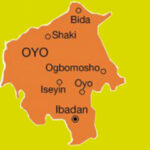
The Minister for Agriculture and Rural Development, Dr Mohammad Abubakar, has said that the country has enough food to feed all citizens.
Abubakar made this known during his presentation at the fifth edition of the “PMB Administration Scorecard 2015-2023 Series,” held at Radio House, Abuja on Monday.
The Minister blamed the rising cost of food in the country on inflation and the aftermath of the Covid-19 pandemic that forced many countries including Nigeria to shut down important economic activities for months.
He noted to improve food stock in the country, the ministry is currently constructing 10 large-scale integrated rice mills with 320 metric tonnes capacity per day in Jigawa, Kano, Adamawa, Niger, Kaduna, Gombe, Ekiti, Ogun, Bayelsa and the Federal Capital Territory in addition to supporting the production and distribution of breeder, foundation and certified rice seeds for farmers.
He also noted that the presidential fertilizer initiative launched in 2016 has increased the number of fertilizer plants from eight to 200 and raised production from 300,000 metric tonnes to seven million metric tonnes.
He said, “We have enough food to take care of Nigerians. We are producing food across the country and we will continue to do so to feed Nigerians in line with our mandate and expedite the transformation of the rural communities of Nigeria.
“As it is today, many parts of the world, including our own country are yet to fully recover from the negative effects of the pandemic, which has triggered inflation and high food costs across the world.
“The fact that some categories of food are imported by Nigeria is not an indication that we have food shortages. The high cost of food that we experience in the country is a result of rising inflation, which is not peculiar to Nigeria but due to the Covid-19 pandemic that forced many sectors of economic production to be shut down for many months.”
He also noted that the ministry was also constructing two 2000 metric tonnes specialized warehouses for the storage of food commodities at federal government-retained silo complexes in Irrua, Edo State and Ilesha, Osun State.
He said, “In a bid to ensure that the country had enough food to eat, the ministry has procured 79,277.30 metric tonnes of food commodities between 2020 and 2021 to replenish the national strategic reserve that was depleted by Covid-19 release and relief to the Poultry Association of Nigeria in 2021.”
Abubakar, however, noted that he was unsure of pastoralists intentionally unleashing their cattle, this was as he assured that the federal government had begun moves to put an end to such conflicts.
He said, “One of the measures to checkmate herders’/farmers’ conflicts is the introduction of the National Livestock Development Programme and the proposal to have ranching and grazing reserves across the country.”





